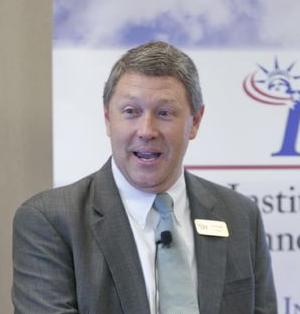
Tom Giovanetti is president of the Institute for Policy Innovation (IPI), a 38-year-old conservative, free-market public policy “think tank” based in Dallas, Texas.
In addition to his administrative and fundraising duties, Tom writes for IPI and for leading publications on a variety of policy topics including tax policy, economic growth, self-government, civil liberties and constitutional protections, judicial supremacy, intellectual property, Social Security personal accounts, technology and Internet policy, and government spending. In addition to being regularly published in major outlets including the Wall Street Journal, Washington Times, FoxNews.com and The Dallas Morning News, Tom writes often for the Fort Worth Star-Telegram. Tom frequently appears in the media and is a regular guest and occasional substitute host of the Mark Davis Show in the Dallas-Fort Worth market.
Tom loves thinking out-of-the-box to design novel solutions to policy problems and explaining complicated policy issues in ways average folks can understand.
Tom's mission at IPI is to use issues to teach conservative, free market thinking and to push back against unprincipled populism. He seeks to encourage continued skepticism of Big Government, to maintain faith in markets, and to defend individual liberty as the best means of achieving human flourishing. His most recent work has focused on free market solutions to student loan debt, preserving online freedom, and persuading state legislatures to override local and municipal rules that restrict economic liberty.
Mr. Giovanetti has represented IPI at many national and international organizations, including the World Intellectual Property Organization (WIPO), the Internet Governance Forum (IGF), and represented IPI during negotiations on the Trans-Pacific Partnership (TPP) trade agreement. Mr. Giovanetti is a popular speaker and writer and testifies before state and federal legislative committees on a variety of topics.
Follow Tom on Twitter (X) at @tgiovanetti
Conservatives Should Celebrate Obama's Commutations
As people who prize liberty and individual rights, and who are skeptical about government power, conservatives need to do a rethink on criminal justice.
Republican Senators Attempt to Kill Email Privacy Act
Although House members recently passed the Email Privacy Act with unanimous consensus, some Republicans in the Senate are trying to kill the legislation. Why?
Trending Topic: Let the Market Work
If customer feedback leads Facebook to design a more robust and transparent system that ensures fairness to all its users, that is a market success, not a market failure. Let’s let it play out.
Letter Regarding Puerto Rico Bankruptcy & Harmful Precedents
Proposed legislation to facilitate Puerto Rico's bankruptcy process continues harmful precedent of throwing investors under the bus but protecting government pension systems.
Trending Topic: Let the Market Work
If conservative concerns lead Facebook to design a more robust and transparent system that ensures fairness to all its users, that is a market success, not a market failure. Let’s let it play out.
Only Government Could Oppose Ride-Sharing
Who could oppose a new service that is universally loved by its participants? Government, of course—especially government at its worst.
Obama Off The Rails On Economy
While Obama can talk the bark off a banyan tree, he cannot make Americans hallucinate prosperity. Obama is the only U.S. chief executivein history not to preside over even one year with 3 percent GDP growth, as the Institute for Policy Innovation’s Tom Giovanetti observes.
It's The Senate's Turn To Protect Your Digital Rights
Presidential politics means we have only about two months left of useful legislative time, so it’s time for the Senate to get its act together and move the Email Privacy Act.
Ride Sharing Is Win-Win-Win For Passengers, Drivers And Cities
Austinites have the opportunity to overturn the city’s mistake and begin unraveling Austin’s protection racket with the taxi industry with Proposition 1.
The Social and Political Cost of Slow Economic Growth
The American people are blaming other countries and other people for a slow-growth wound that is self-inflicted.





